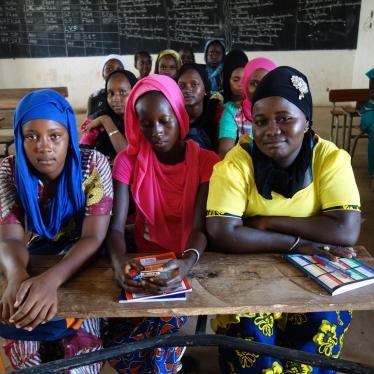Human Rights Watch welcomes the opportunity to make a submission to the inquiry into the implementation of the National Disability Insurance Scheme (NDIS) and provision of disability service providers in New South Wales.
Human Rights Watch is an independent, non-governmental organization that monitors human rights developments in more than 90 countries around the world. For more than 30 years, Human Rights Watch has conducted rigorous, objective investigations into alleged rights abuses and advocated for governments, international organizations and businesses to change their practices to improve protection of human rights.
In February 2018, Human Rights Watch released a report on the situation of people with disabilities in Australian prisons, including in New South Wales.[1] Based on 275 interviews and field research across 14 prisons, Human Rights Watch’s 93-page report, “I Needed Help, Instead I Was Punished”: Abuse and Neglect of Prisoners with Disabilities in Australia,[2] documents how people with disabilities struggle to cope in often overcrowded prisons without adequate access to support services and are particularly at risk of neglect and abuse.
An estimated 18 percent of the Australian population has a disability, but almost half of all people entering prison have a psychosocial disability, with more than one in four reporting that they are currently taking medication for a psychosocial condition. Three out of ten have long-term health conditions or disabilities.
Once in prison, they are unlikely to get the support and services they need, and are too often harassed, abused, assaulted, and raped by both fellow prisoners and prison staff.
The NDIS is an excellent system for people with disabilities who are empowered to make their own decisions. However, there are challenges in its implementation particularly for those with psychosocial or intellectual disabilities. Under the current NDIS model, there is no mechanism to fund services to continue supporting an individual during a prison sentence. For prisoners with psychosocial or cognitive disabilities who transition in and out of prison this is particularly problematic as it results in significantly fragmented support.
The lack of comprehensive mental health and social services has created a pathway to prison for various at-risk populations in Australia. Many people with disabilities encounter the criminal justice system because of the difficulty of identifying and recognizing a disability, of understanding the necessary related support, and of providing adequate community-based health and social services.
Inadequate disability service recognition and support increases the chances that someone with an undetected disability will enter the criminal justice system.
Upon release, people with disabilities often have even less capacity to access support and navigate complex discriminatory structures and are quickly returned to prison, leading to a dangerous cycle and high rates of recidivism. While some jurisdictions have transition and aftercare programs, people who are released often lose contact with them and their mental health deteriorates further, leading to a higher likelihood of re-arrest.
International and domestic best practice models for post-release support emphasize the importance of “through-care” where the same case worker supports the person with a disability during pre-release planning and continues to be involved upon their release from prison.[3] The through-care model is key to ensuring the person with a disability receives adequate support and services to reintegrate the community.
It is essential that the NDIS recognize and address the unique support needs of people with disabilities in prison and engage in pre-release planning.
Based on Human Rights Watch’s extensive research conducted between September 2016 and January 2018, we strongly urge the Committee to:
- Consider how the eligibility of and access to the National Disability Insurance Scheme (NDIS) affects people with disabilities held in prisons and the criminal justice system more broadly.
- Urge the NDIS and Department of Human Services to allow continuity in NDIS benefits to people with disabilities while in prison.
- Ensure the NDIS reaches marginalized groups among people with disabilities, particularly those with psychosocial or cognitive disabilities, who are at risk of having contact with the criminal justice system or experiencing repeated involuntary treatment orders. Conduct outreach to ensure the NDIS serves this cohort, and that their support plans recognize their heightened risk of deprivation of liberty.
- Urge the NDIS and NSW Department of Justice to develop a strategy for correctional facilities to identify people with disabilities while they are in detention so that they can become NDIS participants (where eligible) and develop support plans before being released back to the community.
- If a person’s NDIS plan is suspended while in prison, hospital, or psychiatric facility, it should be reviewed and resumed immediately upon their release so that they receive the supports to which they are entitled.
----------
[1] “Australia: Prisoners with Disabilities Neglected, Abused,” Human Rights Watch news release, February 6, 2018, https://www.hrw.org/news/2018/02/06/australia-prisoners-disabilities-neglected-abused.
[2] Human Rights Watch, “I Needed Help, Instead I Was Punished”: Abuse and Neglect of Prisoners with Disabilities in Australia (New York: Human Rights Watch, 2018), https://www.hrw.org/report/2018/02/06/i-needed-help-instead-i-was-punished/abuse-and-neglect-prisoners-disabilities.
[3] Community Restorative Centre, “Access to the NDIS for people with cognitive disability and complex needs who are in contact with the criminal justice system: Key challenges,” January 2017, https://www.crcnsw.org.au/wp-content/uploads/2017/01/CRC_NDIS_BriefingPaper_Jan2017.pdf (accessed 5 January 2018), p.6.






